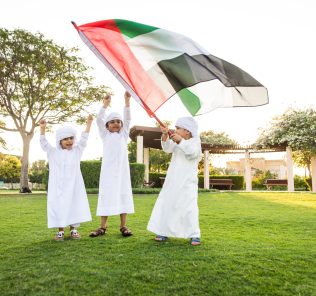As Ramadan 2023 UAE begins, here’s everything you need to know about how it will impact UAE families and the expectations for behaviour and dress of non-muslims.
What is Ramadan?
Ramadan is the ninth month of the Islamic calendar, and for Muslims it is a time dedicated to quiet reflection, prayer, spending time with family and doing charitable works to help those in need. During the month of Ramadan, Muslims fast – meaning that they do not eat or drink anything at all – during daylight hours. Children are not expected to fast until they reach puberty, usually around the age of 14, although some may choose to do so earlier.
Ramadan Rules and Expectations for Non-Muslims
Ramadan is a time of fasting, reflection and spiritual purification for Muslims. The UAE government website states that non-Muslims do not have to fast in Ramadan. However, they are prohibited from eating, drinking and smoking in public during the fasting hours. This includes chewing gum. Additionally, ensure that you do not:
- engage in any aggressive behaviour
- dance or play music in public although you may listen to music quietly with headphones
- wear inappropriate clothing in public
- swear as blasphemy is considered extra offensive during Ramadan
- refuse a gift, or an invitation to join someone at Iftar.
Most nurseries and schools will also hold special community initiatives or events to mark this special month, such as community iftars or donation initiatives. Find out more about what Ramadan means to UAE students and parents and how fasting affects children here.
What should UAE parents know about Ramadan?
The UAE’s eclectic international schools mean that people of all cultures and religions mix regularly at the school gates and in and around classrooms. During Ramadan, this can lead to some questions, as non-Muslims try to navigate the mores and expectations of this special time.
We spoke to a group of Muslim mothers and students connected to Bismillah Buddies – the flagship brand for Uhibbook Publishing, which is dedicated to making Islamic Education fun, engaging and relevant for children – and asked them what they think non-Muslim parents need to know about Ramadan and how it affects family life. Here is what they shared…
“Fasting is not a punishment.”
One of the key misapprehensions that many people have about Ramadan is the idea that it is gruelling or punishing in some way – rather, it is something they look forward to, Muslim parents tell us.
Mona, whose children attend Cambridge International School Dubai, points out that a lot of non-Muslims do not realise and are shocked that fasting means even water cannot be had during the day:
“Yes, fasting means not even water! But it all seriousness, I think it’s important for people to know that it’s not as hard as you might think it is. That we like and want to do it! It brings us closer to Allah.”
Mehnaz Anshah agrees:
“It is a month of deep reflection, heartfelt prayer and self-improvement. The calm and quiet is more important than the loud parties and fancy meals.”
Maria says:
“Fasting over Ramadan is an amazing thing to share as a family and that it is not as hard as it may sound.”
Many children choose to fast, even if they aren’t expected to
Many school-age Muslim children fast; even those who aren’t necessarily expected to do so. Children do not need to fast until they ‘come of age’ or reach puberty, but many choose to and are often allowed to from the age of around eight, or even younger.
Khadijah, a Safa British School mum, says many children want to fast because it brings a great sense of achievement:
“Of being able to defeat your temptations and the peaceful feeling of being in the presence of God and his blessings, as well as the feeling of enjoying the food gathering with family and loved ones after earning your spot (fasting the whole day). This all encourages not only kids but even adults to fast too.”
There is a lot more to Ramadan than just fasting
Ramadan is by no means only about fasting. The most important aspect of Ramadan is “Spending time together, praying for each other, and trying to become better people,” says Mehnaz Anshah, a mother of two and co-founder of Bismallah Buddies, who has published several Islamic Educational books for children and consults with schools and educational institutes on their Islamic Educational Content.
Fellow Muslim mum Zahra, whose boys go to The Gems Legacy School, said that the concepts of kindness, generosity and deep worship are the most important aspects of Ramadan for her family:
“Ramadan is not only about going hungry but also abstaining from a lot of bad habits we may have developed, as a form of cleansing.”
Others might find it offensive if you eat or drink in front of them.
While most Dubai cafes and restaurants now remain open during daylight hours in Ramadan, it is still generally expected that you should not to eat or drink in public during Ramadan (aside from young children). The parents we spoke to were divided on whether eating in front of a fasting person is considered disrespectful; some believed it is offensive, others say it doesn’t bother them at all.
Mubeen, who homeschools, explained:
“I would not find it offensive if someone were openly eating or drinking in front of me during Ramadan, but I would appreciate if they were considerate towards my religious practice. It develops an atmosphere of empathy.”
Muslim mum Azmina agreed:
“I would not find it offensive either – this is part of life and part of the test of fasting during Ramadan.”
However, Nasreen pointed out:
“It is not particularly respectful.”
And Ray said:
“Of course it is offensive. It’s all about people showing some consideration and some empathy.”
Ramadan hours make a big difference to those fasting
Working hours and school timings during Ramadan are shortened by two hours over Ramadan. This means schools are open for a maximum of five hours per day (as opposed to 7 hours usually), with Friday classes needing to be finished by 12pm. While some working parents might find the shorter timings a challenge, it is a huge benefit for fasters, our contacts say:
“We absolutely appreciate the shorter time spent at school,” says Mehnaz. “We are able to spend that time at home doing extra prayers, Ramadan prep and in self-reflection.”
The way you dress matters over Ramadan
When asked what can non-fasting people do to help those who are fasting over Ramadan, the majority sentiment was that it is appreciated if people bear in mind the nature of Ramadan when it comes to their clothing.
Khadijah adds:
“The way people are dressed during Ramadan should be considerate of the month and its holiness. This applies to Muslims themselves too.”
Azmina agrees:
“Cover up and dress decently during school drop off and pick up times.”
Try to be patient over Ramadan
When we asked how others could be respectful to those who are fasting, the most common opinion was for people to be patient and mindful of their peers.
Non-fasters should show empathy and respect to a fasting person, says Mehnaz:
“Be patient with them as they are running on lower energy levels as they get used to the routine.”
Mehnaz also says that sleep deprivation plays a large part, since fasting Muslims will usually get up very early in the morning (often around 3am or 4am) to eat and drink before the sun rises:
“Your sleep cycle is generally disturbed, so any early start times are sometimes challenging. Pick-up-time traffic can be tricky too.”
What are the dates of Ramadan 2023?
The Islamic calendar is based on the lunar cycle, with each month beginning and ending with the sighting of the new moon. The exact timing of Ramadan will therefore be determined by religious and government authorities closer to the time. However, the expected dates of Ramadan are as follows:
Wednesday 22/ Thursday 23 March: Ramadan officially began Wednesday 22/ Thursday 23 March 2023.
Friday 24 March: Last day of term before UAE schools break up for the Spring Break
Monday 27 March: All UAE schools on Spring Break
Monday 10 April: UAE International Curriculum schools return after a two-week Spring vacation (they have the option to extend the Spring Break by up to one week)
Monday 17 April: UAE Ministry of Education (MOE) Curriculum schools return after a three-week Spring Break vacation
Thursday 20 April: Eid Al Fitr is predicted to begin on Thursday 20 April or Friday 21 April. Public holidays will be confirmed closer to the time, but it’s likely that UAE residents will enjoy a long weekend from Thursday 20 April or Friday 21 April – Sunday 23 April or Monday 24 April.
All dates are tentative until there is official confirmation.
How will Ramadan affect children’s life at school?
School Timings during Ramadan 2023
The length of the school day and working day (for both private and public sector workers) is reduced by two hours throughout the holy month.
The Dubai school regulator, the Knowledge and Human Development Authority (KHDA), has stated that Dubai’s private schools can be open for a maximum of five hours of instruction time each day and that classes should end by 12pm on Fridays. There is flexibility for schools to decide the exact start and end time within these guidelines, with many institutions choosing to delay the school start time until around 8am or 9am and to bring the end time forward to around 1pm or 2pm.
Changes to School Lessons during Ramadan 2023
The KHDA advises schools to limit the amount of homework and revision during Ramadan, calling on schools to ensure teachers, students and parents get to spend more time in prayer and with their families.
Although lessons stay largely the same in most schools, it’s possible that they will be shortened by 10 – 30 minutes per lesson in order to allow for the shortened school day overall.
PE lessons may also be adapted to be gentler or more theory-based to allow for children who are fasting, while music lessons may also be adapted to be respectful of the traditions that discourage the playing of live music during Ramadan.
Eating at School during Ramadan 2023
Fasting during Ramadan is one of the Five Pillars of Islam, and it is a requirement for all physically and mentally able adult Muslims to eschew eating and drinking (including water) from dawn until sunset. Many Muslim staff members and children fast during the day – getting up very early or staying up late to eat in hours of darkness – and the shortened school hours are set to help accommodate this fact.
Many school-age Muslim children fast; even those who aren’t necessarily expected to do so. Children do not need to fast until they ‘come of age’ or reach puberty, but many choose to and are often allowed to from the age of around eight, or even younger.
While Dubai cafes and restaurants used to have to apply for a special licence to serve food or drinks during daylight hours in Ramadan, and needed to curtain off any areas where this was happening, these requirements were dropped in 2021. Nevertheless, it is still generally expected that you should not to eat or drink in public during Ramadan (aside from young children).
Children who are not fasting may be required to eat in a special area at school during Ramadan and it is encouraged that they should be mindful of their fasting peers and show sensitivity.
Changes to School pickup and drop-off
Parents will have to schedule later drop-offs and pick-up times for school during Ramadan. Exact timings will vary with each individual school.
It is worth noting that the roads can become extremely busy in the hour leading up to Iftar, which is the moment at which fasting Muslims may break their fast and eat the Iftar meal.
Iftar is expected to happen at 6.31pm on the first day of Ramadan, eventually getting later each day until it is around 6.44pm on the last day of Ramadan.
How School Holidays affect Ramadan 2023
This year the beginning of Ramadan coincides with the start of schools’ Spring Break, so the shortened hours will have less of an impact on lesson timetabling.
Just as Ramadan commences on Thursday 23 March, students immediately break up for the Spring vacation on Friday 24 March.
Students will then have either two weeks or three weeks off school for Spring Break, depending on their school’s individual calendar. Find out how to easily see your own school’s individual academic calendar online here.
This means that when school recommences after the Spring holiday on either Monday 10 April or Monday 17 April, there will be just 1 – 2 weeks left of reduced school hours for Ramadan before Eid Al Fitr on 20 April 2023. This lessens the impact that the shortened Ramadan hours could otherwise have on teaching time.
© SchoolsCompared.com. A WhichMedia Group publication. 2023. All rights reserved.










































































Leave a Response